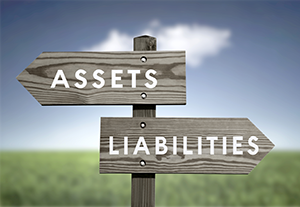Knowing your net worth and understanding how it is changing over time is one of the most important financial concepts that everyone needs to understand. This number is used by banks, mortgage companies, insurance companies and you! Your net worth impacts your credit score, which in turn impacts your interest rates and things as mundane as the amount you pay for auto insurance.
A simple definition
- Net worth is the result of taking all the things you own (assets) minus what you owe others (debts and liabilities).
- Assets include cash, bank account balances, investments, your home, vehicles or anything else that you could sell today for cash. Assets also include any businesses or business interests you own.
- Liabilities are what you owe others, such as a mortgage or car loan, and any other debt, like credit card or student loan debt.
 Your net worth changes over time, reflecting how you spend your money. For example, if you have tons of bills and spend more than you bring in, your bank account balances will be lower. If you spend a lot on your credit cards, your debt will go up. The net effect is a lower net worth.
Your net worth changes over time, reflecting how you spend your money. For example, if you have tons of bills and spend more than you bring in, your bank account balances will be lower. If you spend a lot on your credit cards, your debt will go up. The net effect is a lower net worth.
Everyone has a net worth
Yes, everyone. Even a 6-year-old with money in their piggy bank has a net worth. If your child is saving up for a bike, they will convert one asset (cash) into another asset (their new bike)!
Calculating your net worth
- Step one. Reconcile your bank accounts and loans. Try doing this every month, as these are the easiest parts of your net worth to track and calculate.
- Step two. Calculate the value of all your remaining assets. For some of your assets, such as stocks, you can go online and find the current value of the stocks you own. For other assets, you’ll have to estimate what you could sell that asset for today.
- Step three. Add up all your asset values, then subtract all your debts. What you’re left with is your net worth (and yes, your number could be negative)!
Why you should know your net worth
Knowing your net worth contributes to the big picture of your financial circumstances. Here’s why it’s beneficial to know your net worth:
- You want to apply for student loans. You’ll likely need to submit an application that details all your cash and other assets when applying for student loans. If your net worth is high enough, you may have to foot some of the tuition bill yourself.
- You want to get insurance. Some types of insurance use your credit score as part of the calculation for determining your premium payments. Knowing if you have a high net worth may help in obtaining a favorable premium amount.
- You want to diversify your investments. Certain investments are available only to individuals who have a high enough net worth.
- You want to buy a home. Banks want to see that you have plenty of cash when compared to your debts. If you have too much debt, you may need to either pay down the debt or increase your down payment.
Knowing your net worth and how to calculate it can help you achieve some of your financial goals. Please call if you’d like help calculating and understanding your net worth.

